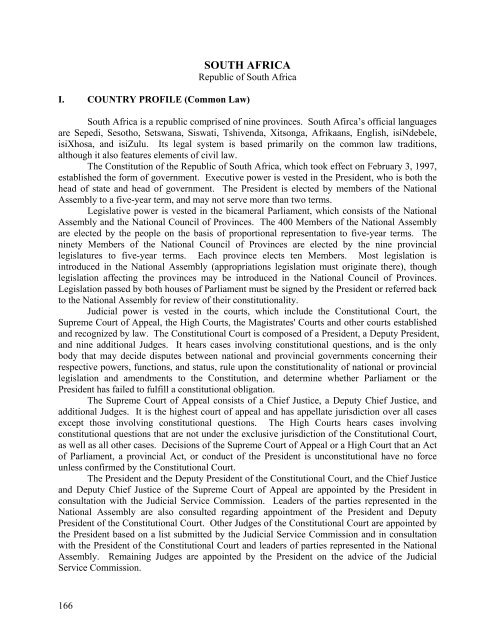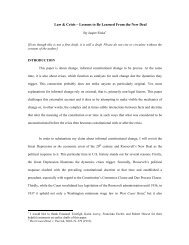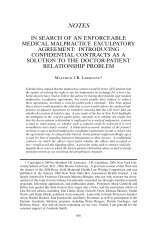Guide to Foreign and International Legal Citations - New York ...
Guide to Foreign and International Legal Citations - New York ...
Guide to Foreign and International Legal Citations - New York ...
You also want an ePaper? Increase the reach of your titles
YUMPU automatically turns print PDFs into web optimized ePapers that Google loves.
166<br />
SOUTH AFRICA<br />
Republic of South Africa<br />
I. COUNTRY PROFILE (Common Law)<br />
South Africa is a republic comprised of nine provinces. South Afirca’s official languages<br />
are Sepedi, Sesotho, Setswana, Siswati, Tshivenda, Xitsonga, Afrikaans, English, isiNdebele,<br />
isiXhosa, <strong>and</strong> isiZulu. Its legal system is based primarily on the common law traditions,<br />
although it also features elements of civil law.<br />
The Constitution of the Republic of South Africa, which <strong>to</strong>ok effect on February 3, 1997,<br />
established the form of government. Executive power is vested in the President, who is both the<br />
head of state <strong>and</strong> head of government. The President is elected by members of the National<br />
Assembly <strong>to</strong> a five-year term, <strong>and</strong> may not serve more than two terms.<br />
Legislative power is vested in the bicameral Parliament, which consists of the National<br />
Assembly <strong>and</strong> the National Council of Provinces. The 400 Members of the National Assembly<br />
are elected by the people on the basis of proportional representation <strong>to</strong> five-year terms. The<br />
ninety Members of the National Council of Provinces are elected by the nine provincial<br />
legislatures <strong>to</strong> five-year terms. Each province elects ten Members. Most legislation is<br />
introduced in the National Assembly (appropriations legislation must originate there), though<br />
legislation affecting the provinces may be introduced in the National Council of Provinces.<br />
Legislation passed by both houses of Parliament must be signed by the President or referred back<br />
<strong>to</strong> the National Assembly for review of their constitutionality.<br />
Judicial power is vested in the courts, which include the Constitutional Court, the<br />
Supreme Court of Appeal, the High Courts, the Magistrates' Courts <strong>and</strong> other courts established<br />
<strong>and</strong> recognized by law. The Constitutional Court is composed of a President, a Deputy President,<br />
<strong>and</strong> nine additional Judges. It hears cases involving constitutional questions, <strong>and</strong> is the only<br />
body that may decide disputes between national <strong>and</strong> provincial governments concerning their<br />
respective powers, functions, <strong>and</strong> status, rule upon the constitutionality of national or provincial<br />
legislation <strong>and</strong> amendments <strong>to</strong> the Constitution, <strong>and</strong> determine whether Parliament or the<br />
President has failed <strong>to</strong> fulfill a constitutional obligation.<br />
The Supreme Court of Appeal consists of a Chief Justice, a Deputy Chief Justice, <strong>and</strong><br />
additional Judges. It is the highest court of appeal <strong>and</strong> has appellate jurisdiction over all cases<br />
except those involving constitutional questions. The High Courts hears cases involving<br />
constitutional questions that are not under the exclusive jurisdiction of the Constitutional Court,<br />
as well as all other cases. Decisions of the Supreme Court of Appeal or a High Court that an Act<br />
of Parliament, a provincial Act, or conduct of the President is unconstitutional have no force<br />
unless confirmed by the Constitutional Court.<br />
The President <strong>and</strong> the Deputy President of the Constitutional Court, <strong>and</strong> the Chief Justice<br />
<strong>and</strong> Deputy Chief Justice of the Supreme Court of Appeal are appointed by the President in<br />
consultation with the Judicial Service Commission. Leaders of the parties represented in the<br />
National Assembly are also consulted regarding appointment of the President <strong>and</strong> Deputy<br />
President of the Constitutional Court. Other Judges of the Constitutional Court are appointed by<br />
the President based on a list submitted by the Judicial Service Commission <strong>and</strong> in consultation<br />
with the President of the Constitutional Court <strong>and</strong> leaders of parties represented in the National<br />
Assembly. Remaining Judges are appointed by the President on the advice of the Judicial<br />
Service Commission.
















